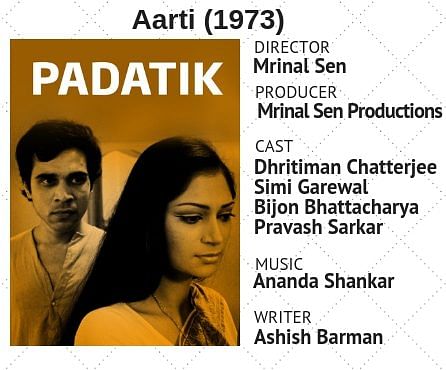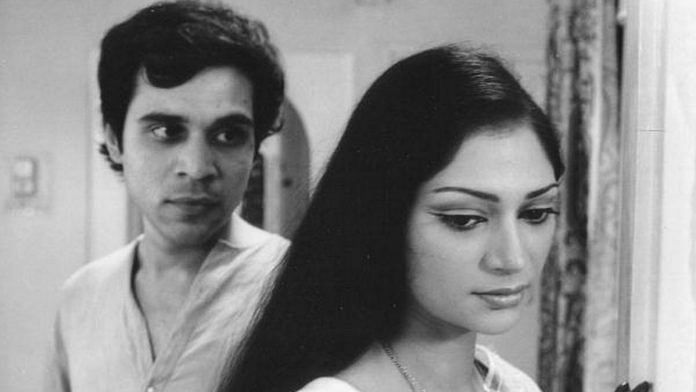Kolkata has been synonymous with political activism since the days of the British rule. So, it’s not surprising that so many Bengali filmmakers were inspired by the city’s politically-charged environment, which their stories are underlined with. One such filmmaker was Mrinal Sen, one of India’s most celebrated and revered directors. Sen was famous for making films that were heavy on political commentary, favouring the Left. His Calcutta trilogy — Interview, Calcutta 71, and Padatik — specially focused on the social evils that were plaguing Kolkata at the time. And as Kolkata goes to polls on Sunday, 19 May, ThePrint looks at one of the three — Padatik, which spoke about a period of political unrest in West Bengal’s capital city.
 For much of its one-and-a-half-hour duration, the film’s story follows Sumit (played by Dhritiman Chatterjee), a young activist of the Communist party. Sumit is on the run from the police. This was Kolkata of the 1970s (Padatik was released in 1973), when the Leftist movement was facing government crackdown. Kolkata was also going through a rough time socially and economically, with poverty and unemployment at an all-time high. With the help of two of his comrades, Sumit seeks refuge in an apartment of a rich divorcee, Mrs Mitra (played by Simi Garewal). Sumit’s father has nearly disowned him, and everyone he knows is either hiding, in jail or dead. Stuck in his current place, Sumit begins to re-evaluate his life, the Leftist movement, and the condition of his beloved city and state.
For much of its one-and-a-half-hour duration, the film’s story follows Sumit (played by Dhritiman Chatterjee), a young activist of the Communist party. Sumit is on the run from the police. This was Kolkata of the 1970s (Padatik was released in 1973), when the Leftist movement was facing government crackdown. Kolkata was also going through a rough time socially and economically, with poverty and unemployment at an all-time high. With the help of two of his comrades, Sumit seeks refuge in an apartment of a rich divorcee, Mrs Mitra (played by Simi Garewal). Sumit’s father has nearly disowned him, and everyone he knows is either hiding, in jail or dead. Stuck in his current place, Sumit begins to re-evaluate his life, the Leftist movement, and the condition of his beloved city and state.
It is difficult to talk about one of the Calcutta trilogy films, without talking about the other two. All three of them together form a cohesive narrative of the City of Joy’s perennial struggles. Given how the city seemingly never changes, something Padatik tells its viewers at the outset, many of the issues that existed at the time strike true even today. Padatik is also interspersed with dramatic headlines of newspapers flashing on the screen, and it strikes you that many of them could just as easily be from today. The same issues of unemployment and basic wages exist, along with some new issues concerning the minority groups, citizenship (NRC), and the farmers’ rights.
Also read: Mrinal Sen, the cinematic genius who had the courage to bring social realities on celluloid
Mrinal Sen, with his masterful use of minimal sets and props, tells the tale of a citizen who is going through what many of us are likely experiencing at the moment — uncertainty. Sen’s signature use of tight, and sometimes uncomfortable, close-ups, and dramatic camera movement help build the tension and discomfort the audience is meant to feel, just like the characters in Padatik. The music, by Ananda Shankar, is very cleverly used to build tension, to create contrast, and, in some scenes, even irony.
When Sumit finally sits down and thinks of the cause he has dedicated his life to, he realises that although he and his fellow comrades have risked their lives to fight for the cause, nothing is coming out of it — Calcutta was showing no signs of improvement. The frustration and angst that Sumit feels over the bits and pieces of news he gets from his one friend who occasionally visits him are striking. It makes you sympathise with the helplessness of the situation, because that is exactly how you could feel even today.
Like most of Mrinal Sen’s films, Padatik’s ending may seem abrupt but it achieves its main objective: of provoking viewers into thinking about the society — about the starving children on the streets, about women’s rights or the lack of it, and about how our contributions to the society are actually affecting it. As we wait and watch Kolkata vote Sunday, there is this hope that we, like Sumit, at least question the status quo, and that we will keep on doing so.
Also read: Soumitra Chatterjee, the Bengali legend you probably haven’t heard of but should




Simi is ageless …